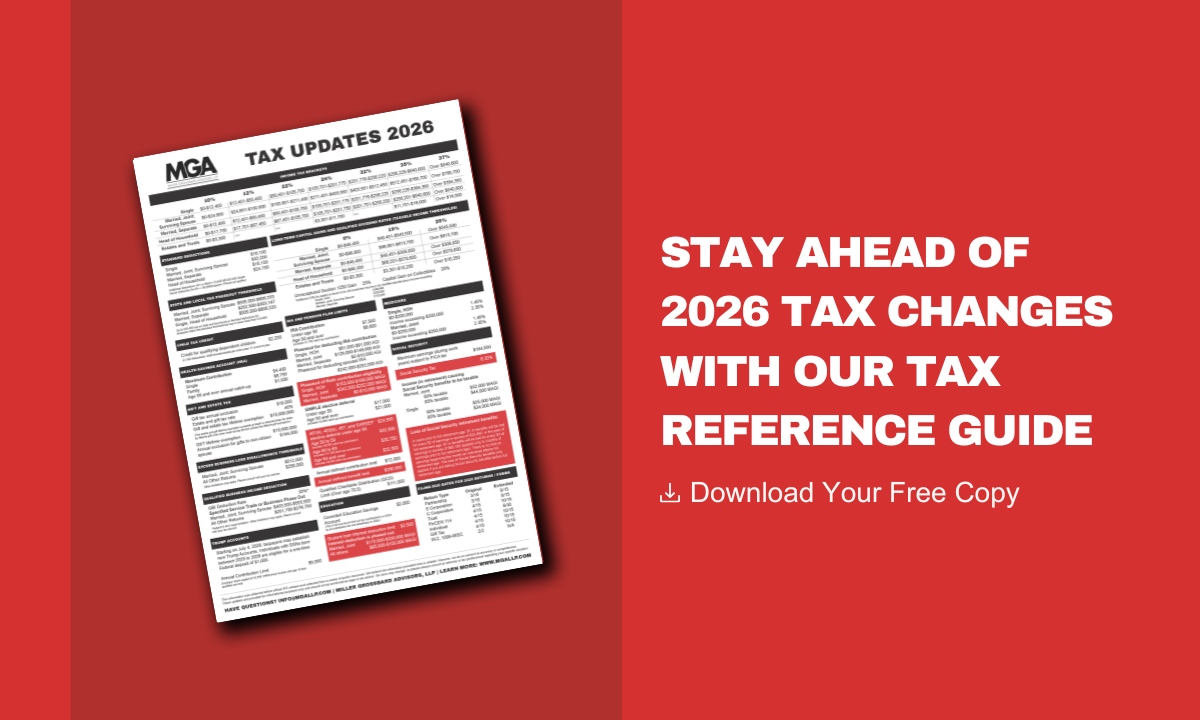President Joe Biden recently announced his $1.8 trillion American Families Plan, which he presented to Congress this week.
This recent blog post of ours shares some highlights of his tax plans. Here, we are discussing new items in this current proposal. There is still a lot to be determined, but the writing is on the wall, and we at MGA are here to help you navigate the ever-changing landscape.
What’s in Biden’s American Families Plan?
- The top individual federal income tax rate would rise from 37% to the pre-Trump rate of 39.6%.
- Taxpayers with incomes over $1 million would pay a tax of 43.4% on capital gains (39.6%+3.8%). It is not yet clear if the $1 million cap would apply per individual taxpayer. If it does, those filing joint returns could have a cap of $2 million.
- An extension through 2025 is proposed for the 2021 increase in the fully refundable child tax credit. It would also rise from $2,000 per child to $3,600 for children under age 6 and $3,000 for children ages 6 through 17.
- Extensions beyond 2021 also are proposed for the increase in the maximum Child and Dependent Tax Credit from $3,000 to $8,000 ($16,000 for more than one dependent); the expansion of, and increase in, the earned income tax credit for younger workers; and the premium tax credits that reduce ACA health insurance premiums.
- The step-up in basis on death would be eliminated for gains in excess of $1 million. At this point, it is unclear if death would create a taxable event or if the liability would be created when the beneficiary sells inherited property with a carryover basis. The Biden Administration is working on ways to protect family farms and family businesses from the impact of this proposal.
- Carried interest loopholes would be eliminated. Changes have already been made to require hedge funds and private equity to hold interests for 3 years for capital gain treatment, but they are proposing more limitations.
- Caps would limit tax deferral for Section 1031 exchanges when the gain on the sale of real estate transactions is greater than $500,000.
- Deductions for business losses in excess of $250,000 if single and $500,000 if married filing jointly would be disallowed and carried forward to future years.
Notable Missing Items That Had Been Previously Proposed
- Changes to the federal gift and estate tax exemption. Currently, the lifetime exemption is $11.7 million, and there was discussion that a significantly reduced exemption would be proposed. This was not included in the proposal.
- The proposal also did not increase the tax rate on the estate tax. The current estate tax rate of 40% was left unchanged.
- An increase to social security taxes on wages and self-employment income for those making over $400,000. It was proposed to increase to 12.4% Social Security tax on all wages in excess of $400,000. This was not included in the proposal.
- There was no mention of trying to reduce the Section 199A 20% passthrough deduction.
- The proposal did NOT remove the $10,000 per taxpayer cap on deductible state and local taxes. There is a strong and large contingent of Democrats in the House who said they would not vote for any other tax increases unless this is removed. This is the biggest quandary. The overriding message is that the top 1% needs to pay their fair share, and this deduction benefits the top 1% significantly more than any other group.
Making the Complex, Changing Laws Simple
As you might have guessed, many of these changes are non-starters for Republicans. Republicans have said they are willing to negotiate on a bipartisan infrastructure deal at a level that is at least a trillion below President Biden’s previous proposal. This American Families Plan, which has a $1.8 trillion price tag for both "hard" and "human infrastructure," is likely to go through heated negotiation. As a result, any final bill will likely only become law if Democrats go the budget reconciliation route in which an overwhelming majority of Democrats in the House and all 50 in the Senate are on board.
Needless to say, your team here at MGA will continue to watch the progress and discussion on both the American Jobs Plan and the American Families Plan and keep you informed.
We are here to make the complex simple.
.png?width=191&name=mgalogofinal-01%20(3).png)




